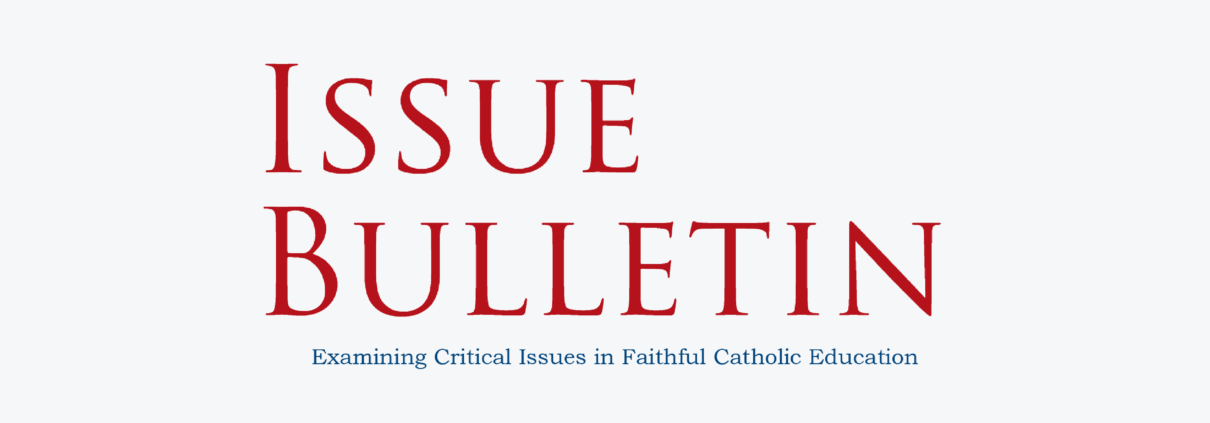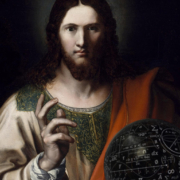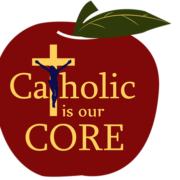Catholic Identity Should Be at Heart of Common Core Decisions
This is part of a series of reports on the Common Core State Standards Initative and its potential impact on Catholic education.
As a former Catholic school administrator, of interest to me are the countless articles detailing the controversy surrounding the Common Core which are dominating educational news stories throughout the United States. While passionate authors express their concerns regarding everything from the federalization of education to compromised standards, of most concern to those who share a passion for the mission of Catholic education are suggestions that adoption of the Common Core could compromise the mission of the Catholic education and ultimately secularize its schools.
Detailed throughout the magisterial teachings of the Church, the mission of Catholic education is described in the Sacred Congregation for Catholic Education’s document, Lay Catholics, Witnesses to Faith (1982):
The integral formation of the human person, which is the purpose of education, includes the development of all the human faculties of the students, together with preparation for professional life, formation of ethical and social awareness, becoming aware of the transcendental, and religious education. Every school, and every educator in the school, ought to be striving “to form strong and responsible individuals, who are capable of making free and correct choices,” thus preparing young people “to open themselves more and more to reality, and to form in themselves a clear idea of the meaning of life” (#17).
How the Catholic Church fulfills its role in Catholic education is outlined in the Code of Canon Law. The Church has a duty and right in education in fulfilling its mission (Canon 794) and considers schools to be of great importance in assisting parents to fulfill the responsibility associated with the education of their children (Canon 796). Acknowledging parents have freedom in their choice of schools (Canon 797), the Church has the right to direct schools (Canon 800), “secure that in civil society the laws which regulate the formation of the young,” (Canon 799), and strive to keep alive the mission of Catholic education (Canon 801).
In regard to the Common Core, how do these standards impact the mission and Catholic identity of schools? As a former accreditation chair for the Southern Association of Independent Schools (offering a dual accreditation from AdvancEd & SAIS), I found that those not entrenched in educationaleze often used terms such as standards and curriculum synonymously. The Foundation for Educational Excellence defines standards as expectations as to what is to be learned at each grade level and discipline. A curriculum is the actual program, textbooks, materials, assessments and resources selected by the school to teach and ensure standards are achieved or “a means to the end”. Standards do not dictate how or by what means a concept is taught but present, at a minimum, concepts to be mastered.
Historically, schools have been evaluated for quality since 1895 (AdvancEd website). More than one-hundred years later, regardless of the accreditation agency (secular, independent, Catholic), guidelines for accreditation include purpose or mission, leadership, teaching and learning, resources, and opportunities available for continuous improvement. Under teaching and learning, schools must adopt academic standards that set expectations for learning, provide for continuity of instruction across subject areas and grade levels, benchmark progress, and create a foundation for standardized testing. In our data-driven world, standards actually provide the measurable outcomes many parents equate with academic excellence. Standards do not provide a ceiling on what a student can learn; they provide a framework for the minimum of what must be achieved during a given year. It is important to note, accreditation guidelines do not dictate curriculum or pedagogy but look to see if the curriculum guides chosen (along with materials and resources) support the purpose or mission of the school.
What is clear about non-public schools, is the flexibility to choose a curriculum with goals in line with the mission of the school and that of Catholic education. How a curriculum is chosen in a Catholic school is primarily determined by how it is governed (archdiocesan, independent, regional, parochial, etc…). Most importantly, Catholic schools are under the authority of an ecclesiastical authority (Canon 803) with instruction and education required to be grounded in Catholic doctrine (Canon 803 § 2). Ultimately, it is the responsibility of the Principal/ Head of School to closely oversee and monitor the implementation of the academic program to ensure that the mission of the school is supported and Catholic identity is not compromised.
From a Catholic identity perspective, a debate could be suggested as to whether the mission of Catholic education is truly at the center of the controversy surrounding the Common Core. If we take to heart the integral formation of each child and consider the goals set forth by the USCCB in Renewing our Commitment to Catholic Elementary and Secondary Schools in the Third Millennium (2005), efforts surrounding the nuances of the Common Core need to be directed to ensuring that Catholic school leadership understands and supports the mission of Catholic education, that parents are considered partners in the education of their children, and ecclesiastical authorities (or their delegates) ensure that the standards and curriculum used in ev- ery school support and strengthen Catholic identity. A discussion as to how Catholic school leaders assess excellence in education should be at the forefront of conversations surrounding Catholic education. Are academic outcomes (SAT, PSAT, ACT, college acceptance) how we measure the success of Catholic education? How do Catholic school leaders gauge whether the integral formation of each child has been achieved?
The Common Core has brought to the attention of countless individuals, many the product of a Catholic education, the need to refocus efforts to ensure that Catholic identity is at the fore- front of discussions related to adoption of the curriculum in Catholic schools. Ecclesiastical leaders must give consideration to educational mandates not created by the Catholic Church. Governing boards, clergy, and superintendents need to carefully weigh who is placed in the position of Principal/Head of School and entrusted with the academic, managerial, and spiri- tual leadership of the school. Catholic parents have both the obligation and the right to edu- cate their children in the Catholic faith (Canon 793) and must act as an advocate for their child by working in partnership with the school. It is the obligation of all constituencies to protect and defend Catholic education, as it is one of the primary evangelization arms of the Church with a legacy that spans over a century.



 St. Agnes School, St. Paul, MN
St. Agnes School, St. Paul, MN


